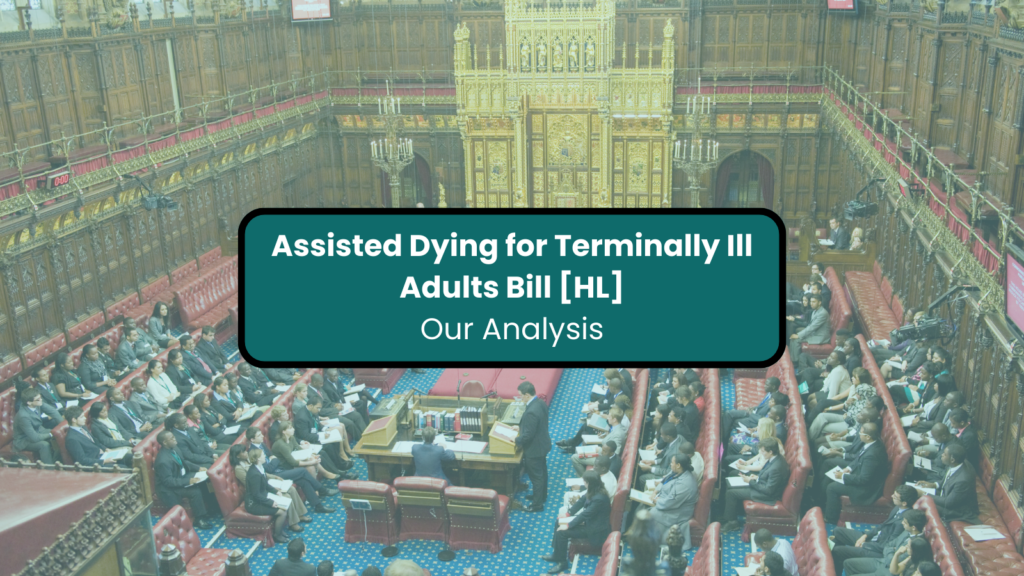 Lord Falconer of Thoroton’s “Assisted Dying for Terminally Ill Adults Bill [HL] “ has been published in the House of Lords, the text of the Bill is available here.
Lord Falconer of Thoroton’s “Assisted Dying for Terminally Ill Adults Bill [HL] “ has been published in the House of Lords, the text of the Bill is available here.
The second reading of the Bill, which is when members of the House of Lords will debate and vote on it, will take place on Friday 15 November.
My Death, My Decision welcomes the Bill for initiating a much-needed debate that has overwhelming public support. Nevertheless, the law if passed will extend only to terminally ill people and does not extend to those with incurable conditions like multiple sclerosis or locked-in syndrome – the latter being a key focus of our campaign.
Here’s our analysis of the Bill with our suggestions as to how it could be made more compassionate.
Terminal Illness
 In order to qualify as ‘terminally ill’ under the Bill, a person must have a prognosis of six months or fewer to live.
In order to qualify as ‘terminally ill’ under the Bill, a person must have a prognosis of six months or fewer to live.
Such a narrow constraint is all the more surprising, given that proposed laws in other jurisdictions around these islands are broader: Scotland has no time limit; Jersey specifies six months generally but twelve for neurodegenerative conditions; and the Isle of Man specifies a maximum twelve months prognosis for all applicants.
But restricting the Bill to just the terminally ill is problematic in itself as it discriminates against individuals who suffer from incurable conditions causing intolerable suffering but which are not terminal illnesses, as mentioned below. A more compassionate and inclusive law would embrace people who are so suffering – and for whom we campaign.
Conditions like paralysis from traumatic incidents (e.g. car accidents), locked-in syndrome, ataxia, severe spinal stenosis, and other spinal issues are not classified as terminal by medical professionals. Additionally, diseases such as multiple sclerosis, Parkinson’s, Huntington’s, progressive supranuclear palsy, and motor neurone disease may not be deemed terminal, or the diagnosis of terminal status may come too late, when the patient is already enduring significant pain or has lost mental capacity.
The requirement of a high court judge
 The requirement for a High Court judge to approve assisted dying requests is an excessive and burdensome barrier and in fact came about in an earlier Bill due to a legal misunderstanding (see Professor Penney Lewis’s essay which explains it).
The requirement for a High Court judge to approve assisted dying requests is an excessive and burdensome barrier and in fact came about in an earlier Bill due to a legal misunderstanding (see Professor Penney Lewis’s essay which explains it).
Not one of the 31 jurisdictions around the world with legal assisted dying requires this. This may cause significant delays, cost and bureaucracy while adding undue stress to terminally ill patients seeking a dignified end to their suffering. Why?
The patient must take the life-ending medication themselves.
The Bill says the patient must take the life-ending drugs themselves, they can’t have a doctor administer them. This places the burden on the dying person. As can be seen from other jurisdictions, allowing doctors to administer the medication ensures a more humane and controlled process, safeguarding the dignity and well-being of the person during their final moments. This whole debate is about individual choice, so why not give them the choice?
In New Zealand, 92% of patients opted for an injection administered by a healthcare professional. In 2022 across Canada there were 13,241 assisted deaths, but fewer than seven deaths were self-administered.
The Bill has welcome provisions against coercion
The Bill’s strict rules against coercion are crucial for protecting vulnerable people from being pressured into their end-of-life choices. The harsh penalties for anyone who tries to force or manipulate someone into seeking an assisted death show how serious the Bill is about keeping these decisions voluntary and well-thought-out. This helps make sure that assisted dying is a choice made freely by the patient.
This Bill ensures the government keeps a close eye on assisted dying.
The Bill’s plan for a mandatory review after five years is a way to see how well the law is working. This review gives a chance to address any issues, listen to feedback from those involved, and make changes to better help terminally ill patients. It shows a commitment to constantly improving and being responsive to how the law is actually used in real life.
The law should however also include provision for a review as to its scope, so that consideration is given as to whether the law should be extended to enable the incurably suffering to ask for help.
What happens next?
Keir Starmer recently doubled down on his vow to give the bill enough parliamentary time to pass, but it’s unclear whether this will apply to a Bill in the House of Lords. Laws that are started by MPs from the elected House have a much better chance of success.
Lord Falconer made a previous attempt to change the law in 2014 but it failed due to the impending General Election in 2015, despite passing the Second Reading in the House of Lords. This Bill will likely need government help if it is not to run out of time.
Trevor Moore, Chair of My Death, My Decision said:
“We commend Lord Falconer for his valiant efforts to move the assisted dying debate forward in the House of Lords. Everyone close to this issue is united in wanting change – we can all surely agree that the current law is inhumane.
Nevertheless, it’s regrettable that this Bill will restrict assisted dying to people who are terminally ill, with a narrow criterion of six months or fewer to live. Politicians must have the opportunity to debate a bill that allows the choice to adults who are suffering unbearably but not necessarily terminally ill – people with conditions like Parkinson’s and Multiple Sclerosis. People who are suffering like that deserve choice, just as much as people who are terminally ill.”
Notes
Media should contact Nathan Stilwell at nathan.stilwell@mydeath-mydecision.org.uk or phone 07456200033.
Media can use the following press images and videos, as long as they are attributed to “My Death, My Decision”.
My Death, My Decision is a grassroots campaign group that wants the law in England and Wales to allow mentally competent adults who are terminally ill or intolerably suffering from an incurable condition the option of a legal, safe, and compassionate assisted death. With the support of over 3,000 members and supporters, we advocate for an evidence-based law that would balance individual choice alongside robust safeguards and finally give the people of England and Wales choice at the end of their lives.

